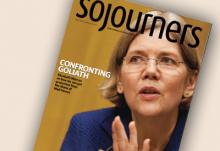Vulnerability
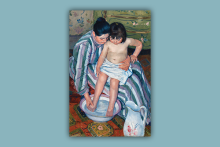
THE DAY AFTER the presidential inauguration in January, Episcopal Bishop Mariann Edgar Budde, preaching at a prayer service for unity attended by President Donald J. Trump, warned members of the new administration that contempt is “a dangerous way to lead a country.” She pleaded for their mercy and compassion for the most vulnerable and outlined a vision for social healing founded on genuine “care for one another.” Budde’s words stand in stark contrast to the campaign of dehumanization and destruction we’ve witnessed since.
In the last few months, I’ve contemplated how, with incredible grace, Budde spoke truth to the power sitting before her in the pews. Her sermon left me feeling calm and convicted and brought to mind one of my favorite artists, the 19th-century impressionist Mary Cassatt. Like Budde’s sermon, Cassatt’s paintings are striking in their softness; they remind me of the kind of activist and person I want to be. I want to live with my heart softened and meet suffering with tenderness.
As Ruth E. Iskin explains in Mary Cassatt Between Paris and New York, Cassatt was “neither simply or completely a bourgeois, nor fully a precursor to the 1890s New Woman, but a mixture of both.” She was “anchored in a transatlantic network that included numerous conservative Americans” and an independent working woman who passionately supported women’s suffrage and full emancipation. In a male-dominated art scene, Cassatt made a name for herself with humanizing portraits of women of all ages, showing the relationship between caregivers and children and the dignity of motherhood. Her layered, emotionally vulnerable pieces highlighted the strength of women and the beauty and seriousness of care itself.
Her politics were characterized by a similar sensitivity. Iskin explains, “[Suffragists] claimed that the very role of mothers in the private sphere justified extending their activity into the public sphere of politics and government.” In other words, they made the case that the qualities of love, strength, and commitment exhibited by many women in their homes would also benefit civic spaces.
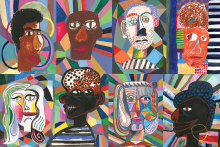
FOR MANY OF US, the approaching holiday season brings a mix of excitement and dread. We look forward to gathering with loved ones we haven’t seen for a while. But these gatherings come with land mines of casually dropped remarks that belie our togetherness. They reveal deep chasms between our understandings of what is good for ourselves, this country, and the world.
Do we respond when a family member says something offensive? Do we ignore them? Do we try to engage, even if past attempts have proven fruitless?
My own attempts to engage with family who have different political views and interpretations of scripture have come to an impasse in the past year. I’ve felt wounded and disappointed and am lowering my expectations for these relationships. But the Spirit is also nudging me to keep my heart open a crack.
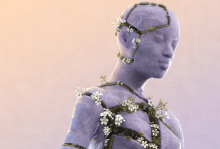
AS WE ENTER the second year of the pandemic, craving juices our throats. We just want to feel alive again: to hear spontaneous laughter and song; to lay our eyes on one another without the mediation of Zoom; to smell a grandchild’s neck without the filter of a mask; to brush against the crowd, breaching the numbness of isolation. We just want to get back to normal, we say. But normal, as science writer Ed Yong observes, is precisely what led to this. Even epidemiologist Michael Osterholm worries that we are “trying to get through this [pandemic] with a vaccine without truly exploring our soul.” Curiously, that puts the depths of soul on the public health agenda.
Insight therapy
COVID-19 has been an epiphany. It has given humanity a first comprehensive, planetary broad brush-up. The pandemic likely was set in motion through ecological disruption, when viruses were loosed from their wild hosts into human sociality, then proceeded to shatter along our nation’s habituated social fault lines—economic, racialized, gendered, and generational.
Every aspect of the coronavirus pandemic first exposed and then exacerbated the United States’ devastating inequalities, reports one investigative journalist after another. The biases of societal racism, classism, and sexism become, in turn, endemic to housing patterns, employment, and access to health care and healthy food. Compounded by the accumulated effects of environmental inequality, such biases become diseases of the body and its generations. Those we cheer on as “essential workers,” the U.S. has come to recognize, were often people whom it first dehumanized—people of color and women working in precarious scenarios of exposure and at low wages. As our planet heats up, each consequent emergency threatens to exacerbate the same fault lines.
While COVID-19 has turned out to be a far more cruciform epiphany than we might have desired, it has, if we are lucky, shaken our sense of invulnerability: Our well-being is entangled, one with another—from how we treat the environment to wearing masks and social distancing. Bodies aren’t born innocent, but from birth carry unequal burdens.

Will we sit and listen to a refugee mother talk about her family’s horrific life in her war-torn country, and realize we’re no longer afraid of her? Will we talk to the gay couple that needs a cake and hear their love story, and feel a bond because it reminds us of our own love story? Will we look into the eyes with the homeless person begging just outside our car window and see another human being in pain, and suddenly feel an urge to help them? Will we make ourselves divinely vulnerable?
In that moment, we reach beyond our fear. We’re finally freed by love. No longer hiding in a tiny room behind a locked door. That. We all need more of that.
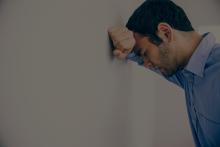
Without a commitment to having hard conversations, and without healthy outlets for them, disagreements can be terrifying. They can seem like the end of the world, especially in the rarified atmosphere of our churches.
Unfortunately, Christians often deal with disagreements in their congregations in one of a handful of ways. We might disagree only in public, or only in denominational forums; we might talk only to our pastor, or only to the people who agree with us; we might let our money do the talking for us; we might not say anything at all; or we might split — leave, get kicked out, break fellowship.
But it doesn’t have to be this way. We can create a culture of rich dialogue, even around our disagreements. We can cultivate community conversations marked by gracious space and spacious grace. This unity is possible because we are bound by a covenant

Some of you might be downright shocked to know that many clergy have to undergo a three-day battery of psych tests as part of the ordination process. If a significant issue is discovered, say, addiction or something else (perhaps the main reason these tests have become required), one's ordination process can be slowed down or halted all together. When I was going through the process, I too went through these evaluations.
The result? I have "a fragile sense of self."
What does this really mean? Well, I'm an alcoholic. It's true. I've spoken about it as part of my faith journey (read: testimony; yes, I have a testimony). I don't wave it around like some flag, but I'm not shy about telling people. And I have certainly told the congregations and other organizations I have served about my history with addiction.
Keeping this stuff secret, for me, is poisonous.
At any rate, there it was, "a fragile sense of self" on my evaluation. This caused everyone to pause. The ordination committee had a ton of questions for me. They did the obligatory background check (this is perfunctory; everyone gets one). They checked my references, etc. They did their due diligence to make sure, as best as anyone could, that I was not going to fall off the wagon.
Of course. No one can promise that. Not really.

“When we were children, we used to think that when we were grown-up we would no longer be vulnerable. But to grow up is to accept vulnerability … To be alive is to be vulnerable.”
These are the words of Madeleine L’Engle, and this week I’ve been reminded of the wisdom they contain.
This weekend, Christianity Today posted an excerpt from my new book, Jesus is Better Than You Imagined, in which I share a story about childhood sexual abuse and my adult struggle to understand my sexuality. Many have asked why I would do such a thing.
This wasn’t a career move or a brazen attempt to sell more books. Being open about these experiences as an evangelical writer leaves me, like so many scarecrows, exposed. I do not plan to become a spokesman for any of the issues addressed in this article. The events shared are a part of my story, but they are not the whole of my calling. Today, I return to my job as a columnist committed to exploring the interface between faith and culture and helping foster difficult conversations that others may be unwilling to have.
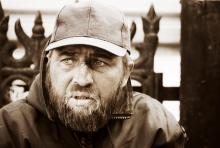
Last weekend, I had the opportunity to spend the night at the Metropolitan House Men’s Shelter, part of Washington, D.C.’s, Metropolitan Memorial United Methodist Church.
And in this experience, Henri Nouwen’s, In the Name of Jesus came to life for me. In reflecting on his own experience of transitioning from Harvard University to L’Arche, a house for mentally disabled individuals, Nouwen realized he had to rediscover his true identity. Up until that moment, Nouwen relied on his accomplishments, achievements, accolades, educational training, and social connections to legitimize his impact and reputation in ministry as a priest. However, at L’Arche none of the things he relied on seemed to matter, and he had to gain credibility with those he planned to serve — the mentally disabled. Nouwen states, “I was suddenly faced with my naked self, open for affirmations and rejections, hugs and punches, smiles and tears, all dependent simply on how I was perceived at the moment” (28). Nouwen was forced to let go of his “relevant” self. Nouwen defines relevant self as, “the self that can do things, show things, prove things, build things.” Nouwen would have to allow himself to become vulnerable while suppressing his “relevant” self.

Last December, I decided to run after dark and entertain myself by running through neighborhoods, looking at lighted Christmas decorations as I passed by. It was a novel twist on my regular exercise, and I enjoyed gazing at the beautiful, the creative, and the tacky alike.
Then, I started noticing the insides of houses, too. The Christmas trees were lit and decorated; the insides of the houses seemed warm and inviting. Suddenly, instead of an independent adult on a crisp winter jog, I felt more like a homeless orphan from a George MacDonald Christmas story looking in at something I did not have and of which I could not be a part. Needless to say, the run lost its sense of adventure.
Recently, it has struck me how strange the situation was, both in what I saw Christmas to be and in my decision that I “didn’t have it.”

While sitting listening to a musician pour out her heart through music at a show the intern house hosted, I was challenged. The emotions in her voice communicated her story and as I sat there pleasantly soaking in the music and admiring her vulnerability, I also realized I wouldn’t want to put myself out there like that. At that same moment, I stopped and thought, is that how I view church? Do I put up those same walls with God?
Vulnerability is difficult, when our culture thrives on individualism. Television shows, books, and movies tell us that we can create the world we desire through our own strength. This culture tells us that we are the creators of our reality, a societal standard that has seeped into the church, creating a standard of self-reliance and individualism.
Brennan Manning stated, “the church is not a museum for saints but a hospital for sinners.” The church “hospital” should be the place where we come ready for healing and treatment. As such, people generally do not go to a hospital hiding their wounds and disease expecting to get better. This self-medication can only cover the symptoms while never combating the true source of the ailment. The truth is that in life, we are all terminally ill patients with different pains in desperate need of a doctor. In this, we are not alone in the fight.
THIS IS A very personal column. Last December I was diagnosed with prostate cancer. There were no symptoms, just a routine blood test. I was on a conference call when the doctor phoned with the biopsy results, but I continued on with the other call assuming I could return it later to hear that there were no problems. There were problems, he told me, and I would need to see a surgeon.
I felt incredulous about the news. I was about to launch a book tour and everything seemed to be in control. Sojourners was involved in intense advocacy work around immigration reform, gun violence, and the budget/sequester battles. There had to be a mistake, or surely some convenient treatment would suffice. Certainly, I would work this all out privately, and stay on schedule for everything else. But then came further testing and discussions of medical options—and anxiety began to grow.
The tour for my latest book, On God’s Side, had to be postponed without announcing why. I kept the health news to a small circle of family, friends, and senior staff, and I did my best to go on as if this wasn’t happening. But it was.
My care shifted to the research center at the National Institutes of Health. There, I took part in a new program using resolution MRI to guide surgical decisions. Such opportunities are available to anyone (people can find out about the work of NIH on its website—sadly, this critical work is being severely cut in the sequester). The NIH staff’s extraordinary knowledge of cancer was immediately evident, as was the wonderful care they showed me.
One of the drawbacks intrinsic to liturgical worship is the length of time it takes to adopt expressions that are newly current and potent into the approved forms. Certain forms of language become deeply important to a generation—key words and symbols that are pregnant with meaning, yet haven’t been incorporated officially into our forms of worship. So we often feel a certain dissonance in church as the language of worship seems impoverished by the absence of expressions we value so highly in our own exploration into God today. I long for prayers that express, directly and passionately, that God suffers. I look forward to praising God’s vulnerability. I am impatient for the recasting of prayer to praise the Creator in terms that unequivocally embrace the evolutionary perspective. In the meantime, preaching is the key field for using this fresh language with passion, in an exciting conversation with ancient expressions and classic symbols that can never become out of date, as long as we use our imaginations to keep on releasing their latent powers.
The scriptures in this season provide rich opportunities for exploring great images of God’s transforming power in vulnerability. Has anyone coined the word “paradoxology” yet to express the essence of transformative Christian worship? Only paradoxical language can point with any degree of success to the mystery of God and the revelatory revolution that springs into life out of the action of Jesus, the passion of Jesus, and the resurrection of Jesus.
Being vulnerable isn’t easy. I think it would be easier to stand outside naked for a moment of mocking than to unveil the inner-self to others for a lifetime of judgment. However, I recently heard theTED Talk below by Brene Brown on her years of study on the subject of vulnerability.
What she discovered moved me to the core.
Brene states that in order for us to connect we have to allow ourselves to be SEEN. This is scary for the shy and the outspoken because we all think the same thing — “Is there something about me that if people knew they would withdraw?”.
Every soul cries: “Am I worthy of connection?” We then allow the mass public to tell us the answer to that. Please note: that unstable analysis can never end well no matter how popular one may seem. This leads us to live in shame of who we are in which Brown describes shame as “the fear of connection.”
I believe I can state truthfully that we live in a world of people full of shame. We’re scared to death of each other!
